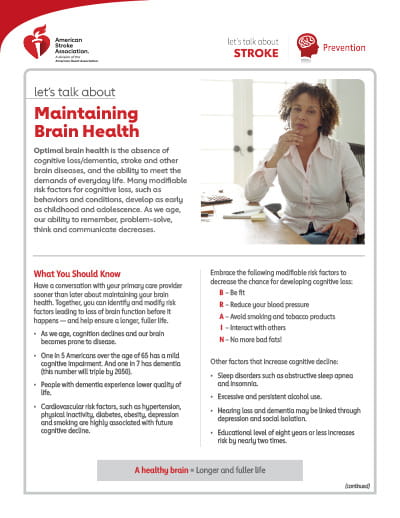Let’s Talk About Maintaining Brain Health
 Optimal brain health is the absence of cognitive loss/dementia, stroke and other brain diseases, and the ability to meet the demands of everyday life. Many modifiable risk factors for cognitive loss, such as behaviors and conditions, develop as early as childhood and adolescence. As we age, our ability to remember, problem-solve, think and communicate decreases.
Optimal brain health is the absence of cognitive loss/dementia, stroke and other brain diseases, and the ability to meet the demands of everyday life. Many modifiable risk factors for cognitive loss, such as behaviors and conditions, develop as early as childhood and adolescence. As we age, our ability to remember, problem-solve, think and communicate decreases.
What You Should Know
Have a conversation with your primary care provider sooner than later about maintaining your brain health. Together, you can identify and modify risk factors leading to loss of brain function before it happens — and help ensure a longer, fuller life.
- As we age, cognition declines and our brain becomes prone to disease.
- One in 5 Americans over the age of 65 has a mild cognitive impairment. And one in 7 has dementia (this number will triple by 2050).
- People with dementia experience lower quality of life.
- Cardiovascular risk factors, such as hypertension, physical inactivity, diabetes, obesity, depression and smoking are highly associated with future cognitive decline.
Embrace the following modifiable risk factors to decrease the chance for developing cognitive loss:
B – Be fit
R – Reduce your blood pressure
A – Avoid smoking and tobacco products
I – Interact with others
N – No more bad fats!
Other factors that increase cognitive decline:
- Sleep disorders such as obstructive sleep apnea and insomnia.
- Excessive and persistent alcohol use.
- Hearing loss and dementia may be linked through depression and social isolation.
- Educational level of eight years or less increases risk by nearly two times.
A healthy brain = Longer and fuller life
What Can You Do?
☑ Know your numbers and undergo regular medical screenings every one to five years in very early adulthood for blood sugar, glucose, cholesterol, smoking status and weight.
☑ Make healthy eating and physical activity part of your life.
☑ Get screened for depression.
☑ If you are experiencing hearing loss, get tested.
☑ If your primary care provider isn’t addressing brain health with you, start the conversation and take control of your brain health. Here are some questions to ask:
- – What are my risks for cognitive impairment?
- – What can I do to lessen those risks and prevent cognitive loss?
- – If I am of a certain race/ethnic group, are my chances higher of having cognitive loss?
- – What can I do to improve my mental sharpness?
- – How do I know if I should be evaluated for depression?
- – Will my hearing problem affect my mental alertness?
How can I learn more?
- Call 1-888-4-STROKE (1-888-478-7653) or visit stroke.org to learn more about stroke or find local support groups.
- Sign up for our monthly Stroke Connection e-news for stroke survivors and caregivers at StrokeConnection.org.
- Connect with others who have also had an experience with stroke by joining our Support Network at stroke.org/SupportNetwork.
Do you have questions for your doctor or nurse?
Take a few minutes to write down your questions for the next time you see your health care professional. For example:
At what age should I start thinking about keeping my brain healthy?
What is Life’s Essential 8™?
We have many other fact sheets to help you make healthier choices, manage your condition or care for a loved one.
Visit stroke.org/LetsTalkAboutStroke to learn more
© Copyright 2022 American Heart Association, Inc., a 501(c)(3) not-for-profit. All rights reserved.
American Stroke Association is a registered trademark of the AHA. Unauthorized use prohibited. WF380486 11/23